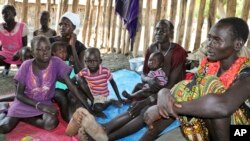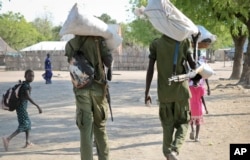The new executive director of the U.N. Children's Fund, Henrietta Fore, warns conditions for millions of children in war-ravaged South Sudan are seriously worsening, as children face hunger, illness and possible death.
Fore has been on the job as UNICEF chief for only 23 days. Yet, she thought it important to visit South Sudan, one of the biggest humanitarian crises in the world, to assess the situation and see what can be done.
She describes conditions as abysmal. She says the country is experiencing the worst food shortages in years, acute child malnutrition rates that already are above the emergency threshold of 15 percent, and escalating gender violence by all warring parties.
"Seventy percent of the children are out of school," she said. "One-third of those schools are closed either due to violence or teachers running away or villagers running away, so that there is no school. And, there is, as many of you know, 17 percent literacy in the country. It is just too low for any of us to feel that you can have a well-governed country or citizens that really will be able to govern their country."
South Sudan's government and rebels signed a cease-fire agreement in December. Fore says this gives her hope that people can move toward reconciliation and peace.
Another hopeful sign, she says, is the government's intention to release some child soldiers in the coming weeks. UNICEF reports more than 19,000 children have been recruited to fight by all the armed groups.
She says UNICEF is working hard to provide education, health, water and sanitation, and protection for children against violence. But, she says funding is not keeping pace with the needs.
Most contributions come from governments. Fore tells VOA in addition to this source, UNICEF is exploring new partnerships in the private sector.
"We really are reaching out to corporations and foundations and individuals across the world," she said. "We think everyone should care about children and their lives and should care about young people.So, our purview is the ages from birth through 18 years old. And, that is a very critical element of all of our world."
The humanitarian crisis in South Sudan has gone on for so long, the UNICEF chief says she worries it is sometimes forgotten by the world at large. She urges nations to remain alert to what is happening there, as so many lives hang in the balance.





